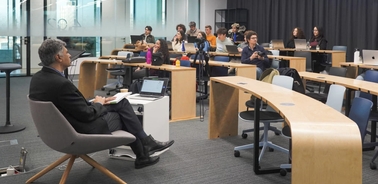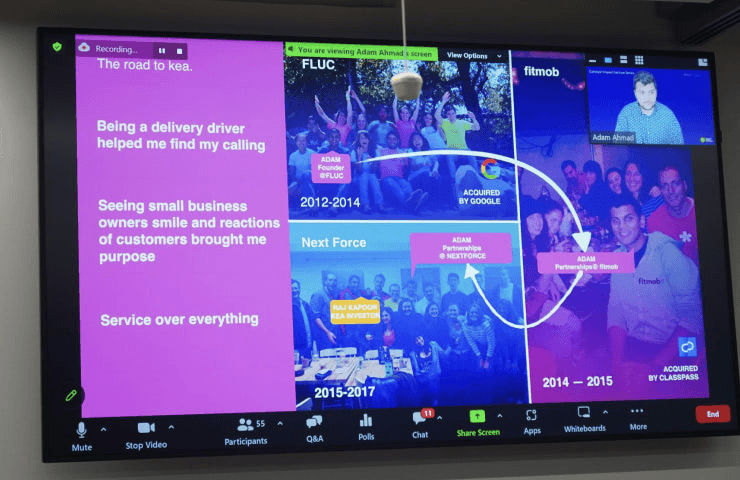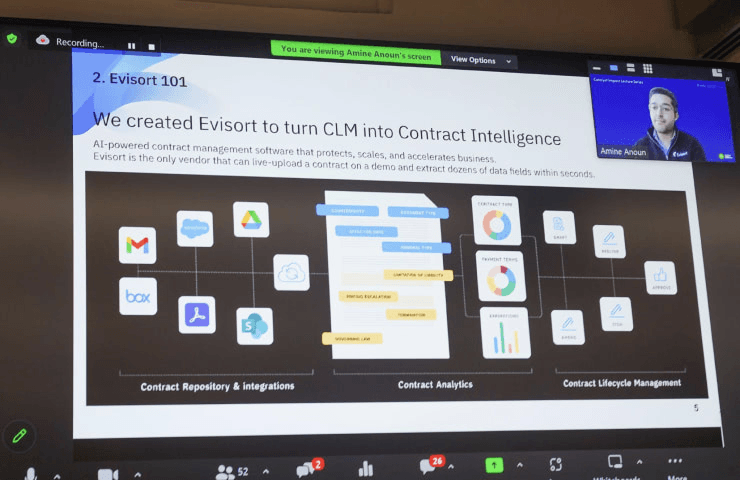Third Catalyst Impact Lecture Featured AI Innovators

IE and UC Berkeley invited CEO of Kea and CTO of Evisort to share insights on their platforms and discuss how AI is revolutionizing their industries.
The third session of the Catalyst Impact Lecture Series, hosted by the IE School of Science and Technology and UC Berkeley's Sutardja Center featured two industry leaders in AI innovation: Adam Ahmad, Founder & CEO of Kea, and Amine Anoun, co-founder and CTO of Evisort.
The two speakers focused on the cutting-edge use of AI with voice recognition and legal ramifications, respectively.
“I am really excited about introducing our next speaker for the series," said Berkeley co-host Victoria Howell. “Adam Ahmad is a serial entrepreneur in the absolute truest sense.”
Ahmad spoke about his entrepreneurial background and his journey to founding Kea, an AI-powered platform that streamlines operations and strengthens customer relations for small businesses.
He spoke about the challenges facing the hospitality industry and how Kea is helping to alleviate the labor shortage by automating phone orders.
“With Kea, 100% of phone calls are answered, converting them into revenues and decreasing the staffing level needed for handling orders and other calls,” Ahmad explained.
He then shared a demo of Kea in action, to which Ikhlaq Sidhu, Dean of the Sci-Tech School and co-host of these series, said he was impressed with how fluid and approachable the AI Voice was.
After some questions from the students, the floor was given to Amine Anoun, who focused on AI for contracts and how Evisort's platform is revolutionizing how enterprises manage their contracts.
Evisort is an AI-powered contract analytics platform that automates contract review and management for enterprises like Microsoft.
Anoun highlighted how the fields are powered by deep learning models that can automatically extract and highlight important information such as counterparties, governing laws, and key dates.
He also mentioned a field called the "executed field," which uses computer vision to detect whether a contract contains a signature.
“There's a lot of intelligence that has to go into creating that distinction and telling you whether your contract has been executed or not,” declared Anoun.
When asked whether Evisort would replace legal professionals, Anoun responded that AI is not expected to reach 100% accuracy. Even if it's 99.9% accurate, there is still a piece of liability that can cost millions of dollars.
“We want this to empower them to do what they do better and faster,” he stated. “I don't expect, even looking five-ten years from now, that it will replace legal professionals."
Through thought-provoking conversations, the Catalyst Impact Lecture Series continues to showcase the most exciting developments in technology, leaving its audience with a deeper understanding of the opportunities and challenges that AI presents in various industries.
Watch past lectures here.

